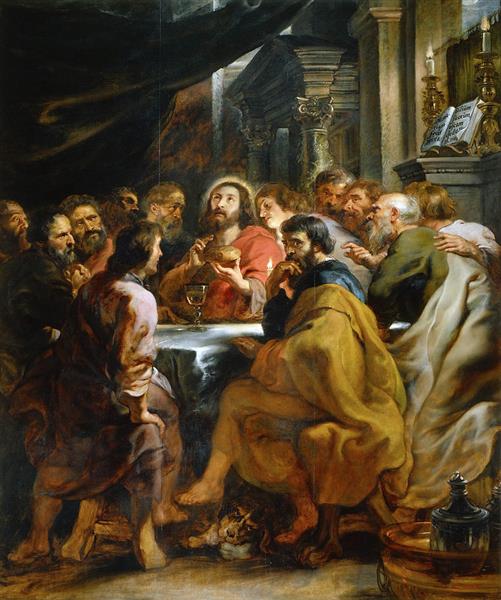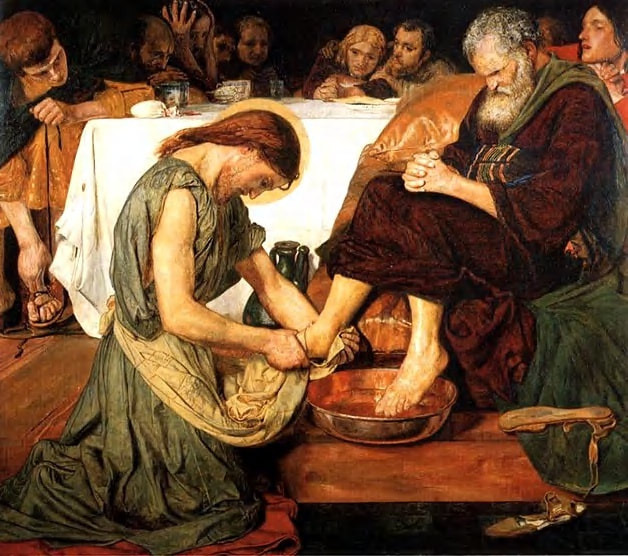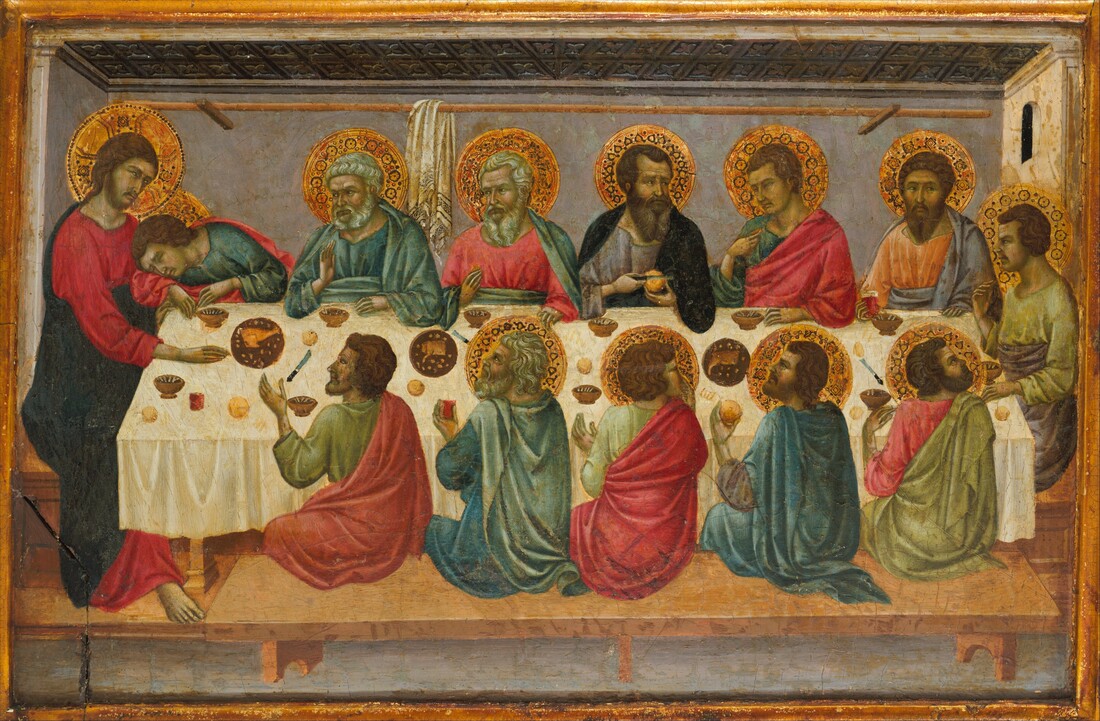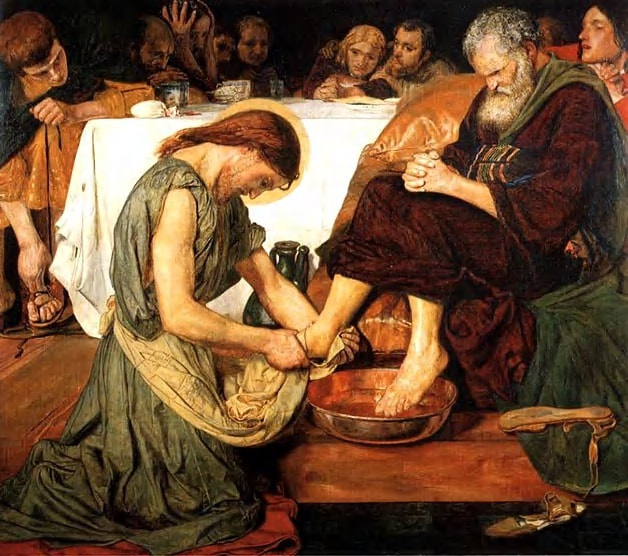1 Corinthians 11:23-32
Pastor James Preus
Trinity Lutheran Church
March 28, 2024
“Our Lord Jesus Christ, on the night in which He was betrayed took bread.” Nothing was hidden from Christ. He knew in just a few short hours, He would be delivered into the hands of evil men, beaten, crucified, and killed. So, in these last few moments with His disciples, Jesus gives His Last Will and Testament to His disciples, which remains unchanged to the end of the age. Which is why it is important that we the Church consider these solemn words of our Lord, which instituted the Sacrament of the Altar.
“Take eat, this is my body given for you. Take drink, this cup is the New Testament in my blood.” What is it? It is the true body and blood of our Lord Jesus Christ under the bread and wine, instituted by Christ Himself for us Christians to eat and to drink. How can we say that bread and wine are Christ’s true body and blood? Because Jesus clearly says so. The Evangelists Matthew, Mark, Luke, and St. Paul record Jesus saying the same thing. None of them record Jesus saying, “this is a symbol” or “this represents my body and blood” or “this is like.” No, He says, “This is.” And Scripture unanimously records Him saying so.
Jesus says that this is His Last Will and Testament. That is what it means when He says that this is the New Testament in His blood. A will and testament cannot be changed once a person has died. These words must remain unchanged. They cannot be interpreted as a figure of speech. When Jesus washed their feet, He immediately explained what He meant by it afterward, that they too were to love one another. He does not explain the Words of Institution as being an example or metaphor.
Yet, how can this be? We can see clearly that it is bread and wine. And Scripture says that Christ ascended to heaven. How can Christ be in heaven and here on earth? How can He be in bread and wine? How can we eat His flesh and drink His blood? Because Christ is true God and true man, so He can do anything. In fact, it is easy for Him to be on many altars at one time. The divine nature and human nature are uniquely joined into a personal union, so that whatever Christ does, He does as both God and man. So, by the power of the Divine, Christ’s human body is present. Where God is, there is Christ, because He is God. And where Christ is, there is both His human and divine natures. For if He were anywhere without His human nature, there He would not be your Savior, who suffered and died for your sins. Those who deny that Christ is present with His body and blood in the Sacrament fundamentally misunderstand the unity of Christ’s human and divine natures.
We do not teach transubstantiation, as the Roman Catholic Church does. Transubstantiation teaches that the bread and wine cease to be, and that only the body and blood of Christ remain. However, St. Paul continues to reference the bread and wine, saying, “Whoever, therefore, eats the bread or drinks the cup of the Lord in an unworthy manner will be guilty concerning the body and blood of the Lord.” (1 Cor. 11:27) Transubstantiation only became a theory in the Middle Ages.
We teach that both the bread and wine, and the body and blood of Christ are present in the Sacrament. However, we do not teach consubstantiation, as the Reformed have accused us. Consubstantiation is the teaching that the bread and wine share one substance with the body and blood of Christ, so that as our teeth chew up the bread, so the body of Christ is torn apart in our mouth. We reject that our teeth cause any harm to Christ’s body when we consume the Sacrament. This is why we say it is His true body and blood in, with, and under the bread and wine. This is a sacramental union. Christ’s body and blood are indeed present in a sacramental mode of presence, so that we can eat and drink His body and blood without causing any harm to His body. Sacramental union simply means that Christ’s body and blood are joined to the bread and wine in an indescribable way, so that the person who eats the bread and drinks the wine indeed eats and drinks Christ’s body and blood, yet without causing any harm.
Christ can be bodily present in more than one way. There is his local mode of presence, whereby He stood before His disciples, ate, and drank with them. There is the way He is present everywhere as God is omnipresent. And there is His mode of presence in the Sacrament, where He can be present with His body and blood while not conforming to the laws of nature. He did this when He exited the tomb on Easter Sunday before the stone was rolled away and when He appeared to His disciples as they hid behind locked doors. We cannot limit Christ’s body by the laws of nature. So, what we receive in the Sacrament is a miracle, which can only be accepted through faith in Christ.
But why should we receive this Sacrament? Because we need it! We are poor sinners doomed to death! Our flesh is corrupt and fights against our new self within us! We live in a world dead-set against our faith in Christ. And the devil prowls around seeking to ruin our faith and hope of salvation. We need help! And the Sacrament offers help.
“If I do not wash you, you have no share with me.” Jesus said when Peter refused to let Him wash his feet. Feeding us His body and blood in the Sacrament is one of the ways Jesus washes us. Here Jesus says a very similar thing as He said in John 6, “Truly, truly, I say to you, unless you eat the flesh of the Son of Man and drink His blood, you have no life in you.” (vs. 53) Here, He is not referring to the eating of the Sacrament specifically, but of the spiritual eating of Christ through faith in His atoning sacrifice for our sins. Yet, when we faithfully eat Christ’s body and drink His blood in the Sacrament, we also spiritually consume His flesh and blood, so that we have His life in us. By faithfully receiving the Sacrament of Christ’s body and blood, we have our feet washed by Christ. We share in Christ, as St. Paul writes, “The cup of blessing that we bless, is it not a participation in the blood of Christ? The bread that we break, is it not a participation in the body of Christ?” (1 Cor. 10:16) St. Peter writes that by His precious and very great promises, “you may become partakers of the divine nature, having escaped from the corruption that is in the world because of sinful desires.” (2 Peter 1:4) If we truly believed in the real presence in the Sacrament, we would have confidence that by this Sacrament, we may defeat Satan and all sinful desires.
We receive the Sacrament for the forgiveness of sins. Christ won forgiveness of sins on the cross for us. The celebration of the Sacrament of the Altar is not a perpetuation of Christ’s Sacrifice on the cross. Rather, it is a means by which Christ gives us the fruit of His cross. When you partake of this Sacrament, you know that the forgiveness Christ died to win is given to you personally. This also strengthens your faith, so that you may persevere until you inherit eternal life.
Receiving the Sacrament also increases our love for one another. “If I then, your Lord and Teacher, have washed your feet, you also ought to wash one another’s feet,” Jesus told His disciples. Jesus washes us by giving us this Sacrament, by loving us and forgiving us. So, by this Sacrament God increases our fervent love toward one another, so that we bear with each other in patience, forgiving each other’s sins, and seeking to serve one another. If Christ, who came to serve and give His life as a ransom for many, now dwells in us, how can we not then serve our brothers and sisters in Christ. By this all will know that we are Christ’s disciples.
That the church should examine communicants before they receive Communion is clear from Scripture, which warns against unworthily eating Christ’s body and blood. And Our Lutheran Confessions emphasize the importance of this ancient practice, saying, “Chrysostom says that the priest stands daily at the altar, inviting some to the Communion and keeping back others.” (AC XXIV) This Sacrament is Christ’s body and blood by power of Christ’s words of institution, whether you believe it or not. So, Christ’s body and blood is eaten both by the worthy and unworthy. Yet, those who receive it unworthily do not eat it for their forgiveness and salvation, but to their own judgment. Many are offended that we do not give Communion to everyone. Yet, by practicing closed Communion, we are faithful to St. Paul’s warning that those who receive it unworthily, eat and drink to their own judgment. It is like a doctor, who gives life-saving medicine to one patient, but does not give it to another, who is not prepared, so as not to cause greater harm. Therefore, we do not give Communion to those who have not been examined, such as little children, to the unbaptized, to those who are in openly unrepentant sin, or those who confess a different faith, because receiving the Sacrament is a confession of unity in faith (1 Cor. 10:16ff).
However, you should take heed that St. Paul says, “Let a man examine himself.” The burden does not lie solely on the pastor to determine who receives the Sacrament worthily, because the pastor can only respond to the public confession of the communicant. But your true worthiness to receive this Sacrament lies in your heart. Therefore, you must examine yourself every time you receive this Sacrament to receive it worthily.
So, how should you examine yourself before you receive Communion? First, by repenting of your sins and seeing your great need for the Sacrament. Your sinful flesh, the wicked world, and Satan, all of which lead you to sin and unbelief, will be harassing you until the day you die. You need this Medicine to strengthen you. Second by confessing what Christ did in order to give this Sacrament of His body and blood to you, namely, He gave Himself for you and shed His blood for you on the cross for the forgiveness of sins. Third, that this Sacrament is the true body and blood of Christ, which was crucified and shed for you on the cross, and which rose from the dead. Finally, that you desire, empowered by Christ dwelling in you through faith, to live better. Receiving this Sacrament while still intending to continue in your sins will cause great damage to your soul. Yet, if you desire to be freed from your sins, this Sacrament will grant you great power.
The Sacrament of the Altar is a means by which Christ may frequently give to us the benefits of His cross, so that we may receive the forgiveness of sins through faith, strengthen our faith, persevere unto salvation, and bear good fruits of love in this life. In this Sacrament, Christ washes us, so that we may have a part in Him. May we cherish this Sacrament until by it we are led to eternal life. Amen.




 RSS Feed
RSS Feed